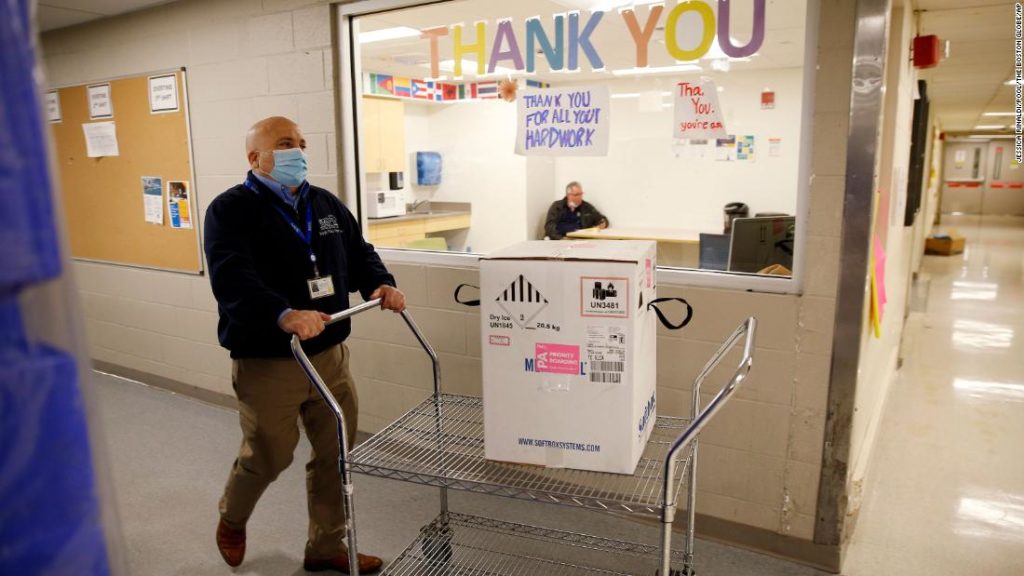A record 110,549 Covid-19 patients were hospitalized Monday, according to the Covid Tracking Project.
That will inevitably lead to more deaths as Christmas and New Year’s Day get closer.
And while more doses of the Pfizer/BioNTech vaccine get sent across the country this week, there won’t be enough for everyone for months.
“This vaccine, as wonderful as it is, is not going to change the trajectory of what we experience this winter,” said Dr. Richard Besser, former acting director of the US Centers for Disease Control and Prevention.
“It’s not going to change what we need to do. It’s not going change the need for us all to wear masks, and social distance and wash our hands.”
What’s next with vaccine distribution
About 2.9 million doses of the vaccine either have been or will be received nationwide this week. That’s enough to start vaccinating 1.45 million people, since each person needs two doses.
“We’re going to have enough for 20 million people to get vaccinated by the end of December,” Health and Human Services Secretary Alex Azar said.
By the end of this month, the US Food and Drug Administration could give emergency use authorization to another vaccine — this one made by Moderna.
If authorized, the US plans to start by shipping about 6 million doses across the country, said Gen. Gustave Perna, chief operating officer of Operation Warp Speed.
Just like the Pfizer/BioNTech vaccine, the Moderna vaccine also requires two doses. It’s up to states to allocate their share of vaccines.
The CDC has recommended that health care workers and residents of long-term care facilities get the vaccine first.
But vaccines will make little impact on what’s already happening: a devastating season that just saw record-high deaths, hospitalizations and new cases.
In the past week, the US has reported an average of more than 215,000 new infections a day, according to Johns Hopkins University.
Infections have increased significantly since Thanksgiving gatherings, and officials say upcoming holiday gatherings will add fuel to the fire
Overcoming vaccine hesitancy
“Nothing has been in my heart more than this issue over the past several weeks to months,” US Surgeon General Dr. Jerome Adams said.
“I’ve been working with Pfizer, with Moderna, with AstraZeneca, with Johnson & Johnson to make sure we have appropriate numbers of minorities enrolled in these vaccine trials so that people can understand that they are safe.”
“There are tens of thousands of Black and brown people dying every year because they are distrustful of the system,” Adams said. “In many cases, rightly so, but also because they’re not getting the facts to help restore their trust in the system.”
“I understand the mistrust among the minority community,” said Lindsay, who is Black. “I don’t ask people to do anything that I would not do myself. And so I was happy to volunteer to be among the first.”
She said she didn’t know she’d make history as one of the first members of the public to get a Covid-19 vaccine.
“That’s not why I did it,” Lindsay said. “I wanted to do it to inspire people who may be skeptical about taking the vaccine and trust in the science.”
States and cities crack down
In the meantime, the US is preparing to face some of the pandemic’s darkest days yet.
In California, Gov. Gavin Newsom said that while the vaccines offered a moment of hope, he added “we are in the midst of the worst moment of this pandemic.”
The state added more than 30,000 new Covid-19 cases for the fourth straight day and hospitalizations and ICU admissions are at all-time highs.
More than 4,200 people are hospitalized with Covid-19, officials said, and 21% of those are in the ICU.
In New York City, Mayor Bill de Blasio hinted at tighter restrictions in the coming weeks, saying the city was on a “very troubling” trajectory, “in terms of the number of people who get sick, the number of people we would lose … and obviously the impact on hospitals, their ability to treat people.”
“We’ve got to start planning on bigger actions now,” he said Monday. “I think the natural time to do that is immediately after Christmas.”
“We will be monitoring and evaluating our current situation day to day and … (we) will remain under the current restrictions for now, with the goal of getting through the next month.”
“But I need to be clear,” the governor added. “If officials and experts agree that our trends are going beyond our ability to respond, I will be forced to come in front of you all again with tougher actions.”
CNN’s Brandon MIller, Andy Rose, Cheri Mossburg, Shelby Lin Erdman and and Omar Jimenez contributed to this report.
You may also like
-
UK coronavirus variant has been reported in 86 countries, WHO says
-
NASA technology can help save whale sharks says Australian marine biologist and ECOCEAN founder, Brad Norman
-
California Twentynine Palms: Explosives are missing from the nation’s largest Marine Corps base and an investigation is underway
-
Trump unhappy with his impeachment attorney’s performance, sources say
-
Lunar New Year 2021: Ushering in the Year of the Ox

